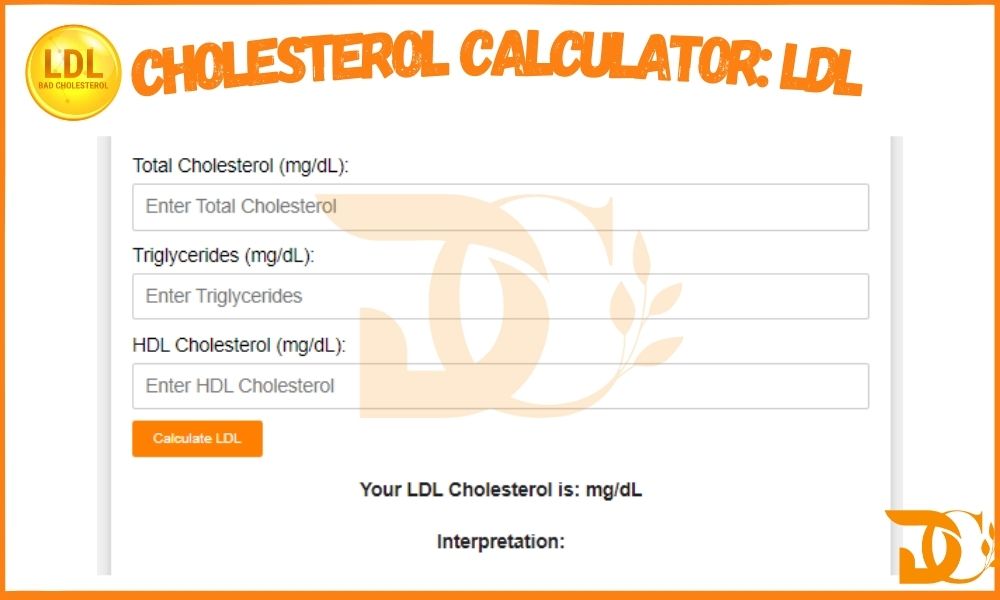This Cholesterol Calculator LDL allows you to conduct a self-assessment. Use your blood test results, to calculate the Low-Density Lipoprotein (LDL-C) using Friedewald Equation.
Cholesterol Calculator: LDL
Your LDL Cholesterol is: mg/dL
Interpretation:
Remember:
- The triglycerides test should only be calculated when fasting.
- The Friedewald formula, on which this Cholesterol Calculator LDL is based, is known to be inaccurate at extremes of triglycerides and total cholesterol.
Keep in mind that this LDL cholesterol calculator is by no means a substitute for professional medical advice. If the results are concerning, be sure to schedule an appointment with your healthcare provider.



Total Cholesterol Calculation Formula
total cholesterol = HDL + LDL + 0.2 × triglycerides
LDL Cholesterol Calculator Formula
LDL = TotalChol - (Triglyceride / 5) - HDL
Total Cholesterol Levels
Total cholesterol provides a broad perspective on your cholesterol status. However, it can be deceptive because it amalgamates both beneficial and harmful cholesterol levels in your bloodstream, lacking specificity regarding heart disease risks.
- Optimal: Less than 200 mg/dL.
- Borderline: 200-239 mg/dL.
- High: 240 mg/dL and above.
LDL (Low-density lipoprotein) Levels
LDL is often referred to as the "bad" cholesterol, as it tends to build up in your arteries and can contribute to severe health issues like heart attacks. Maintaining a lower LDL level is desirable for good health. It's crucial to keep in mind that if your LDL level is elevated, consulting a medical professional is essential to investigate potential risk factors associated with heart diseases.
- Optimal: Less than 100 mg/dL.
- Near optimal/above optimal: 100 to 129 mg/dL.
- Borderline high: 130 to 159 mg/dL.
- High: 160 to 189 mg/dL.
- Very high: 190 mg/dL and above.
HDL (high-density lipoprotein) Levels
HDL (high-density lipoprotein) is often referred to as the "good" cholesterol found in your bloodstream. It plays a vital role in transporting cholesterol from various body tissues to the liver for metabolism and elimination through bile acids. As a result, maintaining high levels of HDL cholesterol is crucial. It's worth noting that women tend to have slightly higher HDL levels than men.
- Healthy Range: 60 mg/dL and above.
- Moderate: 40-59 mg/dL.
- Increased Heart Disease Risk: Less than 40 mg/dL.
Triglycerides Levels
Triglycerides are not cholesterol; rather, they are a form of fat carried in your bloodstream. The majority of triglycerides in your body are stored as body fat. However, elevated triglyceride levels can serve as an indicator of a lipoprotein issue, often seen alongside other symptoms like diabetes.
- Healthy Range: Less than 150 mg/dL.
- Borderline High: 150-199 mg/dL.
- High: 200-499 mg/dL.
- Very High: 500 mg/dL or higher.
What causes high cholesterol?
High cholesterol levels, specifically elevated levels of low-density lipoprotein (LDL) cholesterol, can result from various factors. Here are some common causes and risk factors for high cholesterol:
- Diet: Consuming a diet high in saturated fats and trans fats, often found in red meat, full-fat dairy products, and fried foods, can lead to higher LDL cholesterol levels.
- Lifestyle Choices: Lack of physical activity and a sedentary lifestyle can contribute to elevated cholesterol levels. Regular exercise can help increase high-density lipoprotein (HDL) cholesterol, which is beneficial.
- Genetics: Some individuals may have a genetic predisposition to high cholesterol. Familial hypercholesterolemia is an inherited condition that leads to very high LDL cholesterol levels.
- Weight: Being above normal weight can increase LDL cholesterol and lower HDL cholesterol levels. Calculate your IMC using this tool.
- Smoking: Smoking damages blood vessels and lowers HDL cholesterol. It also makes LDL cholesterol more likely to stick to artery walls.
- Age and Gender: Cholesterol levels tend to rise as people age. Women usually have lower LDL cholesterol levels than men until menopause when their levels often increase.
- Diabetes: People with diabetes are more likely to have elevated triglycerides and lower HDL cholesterol, which can contribute to higher overall cholesterol levels.
- Other Medical Conditions: Certain medical conditions, such as hypothyroidism, kidney disease, and liver disease, can lead to high cholesterol levels.
- Medications: Some medications, including certain diuretics, beta-blockers, and corticosteroids, can influence cholesterol levels.
- Dietary Choices: A diet high in refined sugars and carbohydrates can lower HDL cholesterol and increase triglyceride levels.
- Alcohol: Excessive alcohol consumption can raise triglyceride levels and, in some cases, lead to high cholesterol.
- Stress: Chronic stress may affect cholesterol levels indirectly by promoting unhealthy lifestyle choices, like overeating or smoking.
How to lower your cholesterol?
Lowering your cholesterol levels is essential for reducing the risk of heart disease. Here are some strategies and lifestyle changes you can adopt to help lower your cholesterol:
1. Healthy Diet:
Reduce Saturated and Trans Fats: Limit your intake of foods high in saturated and trans fats, such as red meat, full-fat dairy products, and fried and processed foods.
Choose Healthy Fats: Replace saturated fats with healthier fats, like monounsaturated fats found in olive oil, and polyunsaturated fats found in nuts, seeds, and fatty fish like salmon.
Increase Fiber: Consume more soluble fiber-rich foods like oats, beans, fruits, and vegetables, as they can help lower LDL cholesterol.
Include Plant Sterols: Some foods are fortified with plant sterols or stanols, which can help reduce LDL cholesterol absorption.
2. Regular Exercise:
Engage in regular physical activity, aiming for at least 150 minutes of moderate-intensity aerobic exercise per week. Exercise can raise HDL cholesterol (the "good" cholesterol) and lower LDL cholesterol.
3. Maintain a Healthy Weight:
Losing excess weight can lower LDL cholesterol and improve overall heart health.
4. Quit Smoking:
Smoking damages blood vessels and lowers HDL cholesterol. Quitting smoking can have a positive impact on your cholesterol levels and overall cardiovascular health.
5. Limit Alcohol Intake:
If you drink alcohol, do so in moderation. For most people, this means up to one drink per day for women and up to two drinks per day for men.
6. Medications:
If lifestyle changes alone are not sufficient to lower your cholesterol, your healthcare provider may prescribe cholesterol-lowering medications like statins. These drugs can be highly effective in reducing LDL cholesterol.
7. Omega-3 Fatty Acids:
Include foods rich in omega-3 fatty acids in your diet, such as fatty fish (e.g., salmon, mackerel), flaxseeds, and walnuts. Omega-3s can help lower triglycerides and reduce the risk of heart disease.
8. Control Portion Sizes:
Be mindful of portion sizes to avoid overeating and consuming excessive calories and saturated fats.
9. Stress Management:
Chronic stress can contribute to poor eating habits and may affect cholesterol levels indirectly. Engage in stress-reduction techniques like yoga, meditation, or deep breathing exercises.
10. Regular Check-Ups:
Schedule regular check-ups with your healthcare provider to monitor your cholesterol levels and discuss your progress in managing them.
11. Prescribed Medications:
If you have a high risk of heart disease or your cholesterol levels are not responding to lifestyle changes, your doctor may prescribe cholesterol-lowering medications.
What is the normal range for LDL cholesterol?
The normal range for LDL (Low-Density Lipoprotein) cholesterol is typically less than 100 milligrams per deciliter (mg/dL). However, what is considered optimal can vary based on an individual's risk factors and overall health. It's essential to consult with a healthcare provider for personalized cholesterol level recommendations.
Does LDL go up with age?
Yes, generally, LDL cholesterol levels tend to increase with age. This increase is a natural part of the aging process for many people. However, it's important to note that lifestyle factors and genetics also play a significant role in determining cholesterol levels.
What raises LDL cholesterol the most?
- Diet High in Saturated Fats
- Trans Fats
- Lack of Physical Activity
- Genetics
- Certain Medications


Leave a Reply